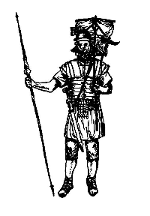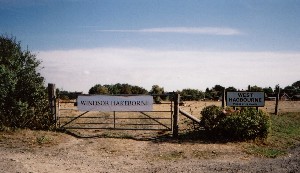|
|
How did the village get
its name?
Saxon origins
The first part of the word Hagbourne originates from the Saxon
name Hacca, whilst bourne comes from the Old English word burn,
meaning a small stream, thus creating Haccaburn.
 Local tradition has it that Hacca was a soldier in the Saxon army
that came up the Thames and claimed the land near the stream.
It is said that Hacca settled there, thus giving his name to the
stream which links West and East Hagbourne via a whole network
of springs, brooks and ditches. Thus the area eventually came
to be known as the Hagbournes.
Local tradition has it that Hacca was a soldier in the Saxon army
that came up the Thames and claimed the land near the stream.
It is said that Hacca settled there, thus giving his name to the
stream which links West and East Hagbourne via a whole network
of springs, brooks and ditches. Thus the area eventually came
to be known as the Hagbournes.
King Alfred's Charter
The name of the
stream has changed over the centuries from such Anglo-Saxon versions
as haccaburna, hacceburnan and haccebroce, before finally settling
on its modern version, Hakka's Brook. We know this because the
stream is mentioned in a very early charter of about 895AD, whereby
King Alfred exchanged various pieces of land, including Hagbourne,
with the Bishop of Winchester. This charter calls the land hacceburnan
and refers to the stream as haccebroce. This is the earliest
known written reference to the Hagbournes.
Windsor Hakeborne
Throughout history place names have been strongly associated with
the people who have lived in them and vice versa. This has applied
equally to small cottages and manorial estates. During Medieval
times, one of the family names most strongly attached to West
Hagbourne was that of the Windsors. According to the Domesday
Book, Walter, son of Other (believed to be a Norman knight), held the
manor of West Hagbourne in 1068. He was made the first constable
of Windsor Castle by William the Conqueror and assumed the surname
de Windsor, thus founding the Windsor dynasty. The Windsors held
the manorial estate of West Hagbourne for nearly 600 years. As
a result, West Hagbourne became known as Windsor Hakeborne during
the Middle Ages.
Walter, son of Other (believed to be a Norman knight), held the
manor of West Hagbourne in 1068. He was made the first constable
of Windsor Castle by William the Conqueror and assumed the surname
de Windsor, thus founding the Windsor dynasty. The Windsors held
the manorial estate of West Hagbourne for nearly 600 years. As
a result, West Hagbourne became known as Windsor Hakeborne during
the Middle Ages.
West Hagbourne emerges
The village name has evolved through numerous variations including
Westhacheborne, Westhakeburn and Westhakebourne. It was not until
the 19th century that the version West Hagbourne finally emerged.
|
